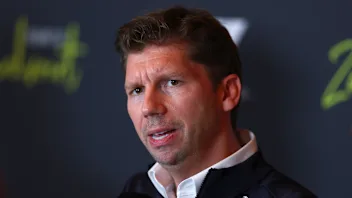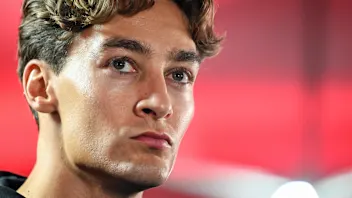F1 Team Principals Unpack 2025 Strategies and Future Visions at Dutch Grand Prix
F1 Team Principals Unpack 2025 Strategies and Future Visions at Dutch Grand Prix
ZANDVOORT, Netherlands – Ahead of the highly anticipated 2025 Dutch Grand Prix at Zandvoort, the paddock buzzed with strategic discussions as team principals from Mercedes, Williams, and Alpine gathered for a press conference. The dialogue provided a candid look into their immediate season aspirations, long-term development plans, and the intricate dynamics of driver management and future regulations.
Williams Eyes Strong Performance Amidst 2026 Focus
James Vowles, Team Principal for Williams, expressed considerable optimism for the team's prospects at Zandvoort, citing the track's suitability for their car. Despite a recent upgrade at Spa, Vowles acknowledged the fierce competition in the midfield, particularly the intense battle for fifth place in the Constructors' Championship.
"The car characteristics suit Zandvoort well," Vowles stated, highlighting the team's confidence. However, he also revealed a critical strategic dilemma: "Prioritizing future development (for 2026 regulations) might compromise our current season standing." Despite this, Vowles emphasized the importance of maximizing points in the upcoming races at Zandvoort, Monza, and Baku, where Williams anticipates strong performances.

Mercedes Navigates 2026 Regulations and Driver Loyalty
Mercedes Team Principal Toto Wolff mirrored Vowles' sentiment regarding the prioritization of future regulations, underlining the immense complexity of the impending 2026 rule changes. Wolff outlined a meticulous strategy: "optimizing the current car without major upgrades, focusing on learning for the 2026 season."
While acknowledging that winning championships remains the ultimate goal, Wolff offered a nuanced perspective on performance, noting that "lower championship standings can provide advantages in wind tunnel time for the following year." He also touched upon the fluctuating pace of the cars, which he admitted makes driver performance predictions challenging.
Wolff spoke highly of his former driver, Valtteri Bottas, who is reportedly moving to Cadillac, praising his "speed and experience" and expressing happiness for Bottas' new opportunity. On the topic of team dynamics, Wolff emphasized the critical importance of "loyalty and transparency within his team, particularly in driver relationships," while also acknowledging the need for strategic flexibility.
Discussions around George Russell's ongoing contract negotiations with Mercedes were also addressed, with Wolff indicating that an agreement is largely a "formality" and that discussions are continuing to "optimize Russell's performance and team integration."

Alpine's Driver Philosophy and Team Reinforcement
Flavio Briatore, representing Alpine, shed light on his team's driver strategy, confirming that Valtteri Bottas was "never a serious option for Alpine, despite discussions." Briatore clarified that he is "looking for different attributes in drivers" and remains firmly focused on the future of the team.
He also delved into the challenges faced by young drivers, such as Franco Colapinto, in the demanding current F1 environment, suggesting that "the high demands of the cars and the sport might require more time for development." Briatore expressed strong confidence in Pierre Gasly as a "core driver for the team's future" and highlighted the significant arrival of Steve Nielsen as Team Manager, emphasizing his "crucial role in coordinating the team's operations." Briatore also swiftly dismissed rumors linking Christian Horner to Alpine, stating unequivocally that Horner is "not currently part of the team's plans."
Common Threads: Driver Development and Future Innovations
The press conference also revealed shared perspectives among the principals. When asked about potential driver choices for Cadillac, both Toto Wolff and James Vowles leaned towards "experience," while Briatore chose not to comment. The immense pressure faced by young drivers in top teams was a recurring theme, with Wolff and Vowles contrasting it with the more "relaxed environments in smaller teams" which allow drivers to perform more freely, citing Franco Colapinto's success at Williams as an example.
On the technical front, Wolff offered a speculative insight into car development, suggesting that "with the right energy deployment, cars could potentially reach 400 km/h on certain straights," though he clarified this was a hypothetical scenario. The unpredictable nature of Formula 1 was underscored by a brief mention of Lance Stroll's crash during practice, serving as a reminder of the constant challenges within the sport.